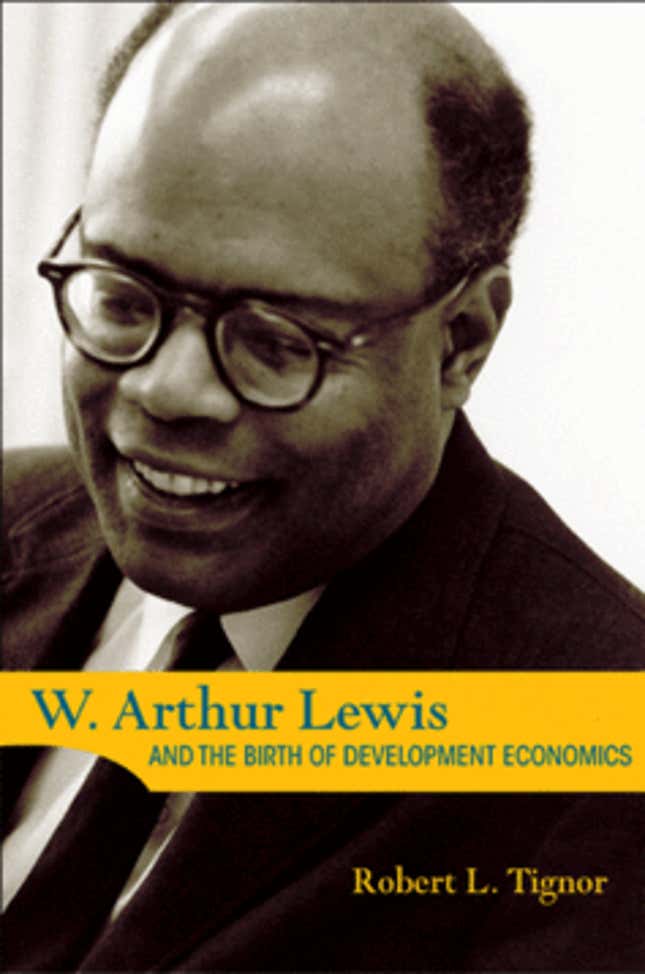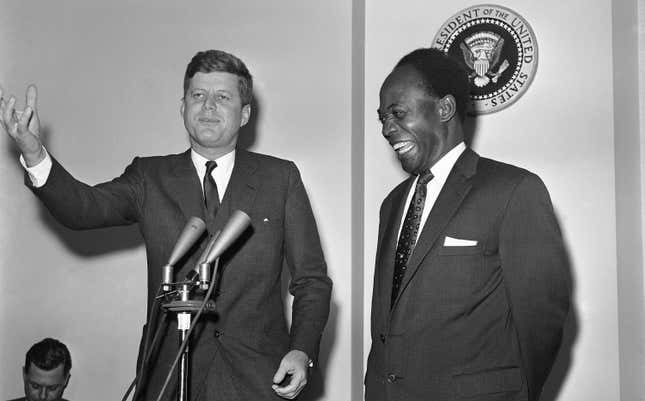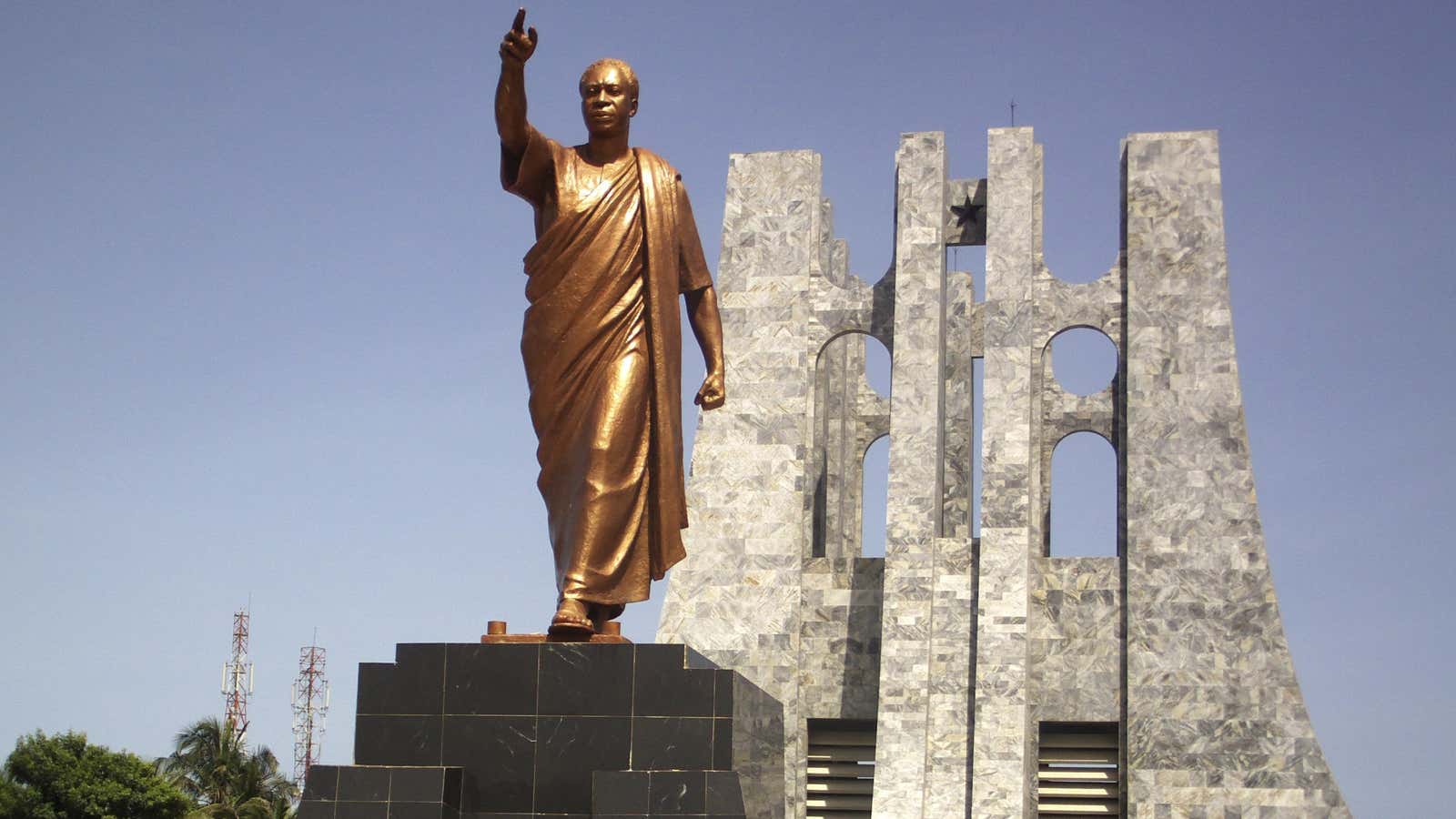Ghana, the first sub-Saharan country to gain independence, celebrates the 59th anniversary of its freedom from British rule this year. According to Nelson Mandela Ghana’s independence on March 6, 1957, provided much strength and great inspiration to African liberation movements. This article is a foundation essay. These are longer than usual and take a wider look at a key issue affecting society
Ghana was to become the testing ground for Arthur Lewis’ ideas on economic development. The excitement surrounding Ghana’s independence in 1957 as tropical Africa’s first decolonized territory captivated Lewis as thoroughly as it did African nationalists and Afrophiles around the world. Lewis, a St Lucian, went on to win the Nobel Memorial Prize in Economics in 1979.
A veritable who’s who of intellectuals of African descent living in the Americas flocked to Accra. They were determined to show the world that Africans could govern themselves and achieve more for their people than the colonial rulers had. They were eager to make Ghana a shining example to inspire independence movements across the continent.
If, then, Lewis saw Ghana as a proving ground for his ideas on economic development, later scholars have viewed the Kwame Nkrumah years (1951-66) as a case study of striking failure.
From a country that seemed on the threshold of robust economic progress, it descended into economic misery and political instability.
Although Lewis was remarkably well informed on Ghana and knew many Ghanaian officials personally, he was not fully prepared for the complexities of his new position. Nor was he prepared for the fragility of Ghanaian economics and politics.
Seek ye first the political kingdom
The expectations surrounding Lewis at the time of his arrival were staggering. Since they were also highly contradictory, he could not meet all of them.
The Ghanaian politicians insisted that Lewis assert Ghana’s economic independence from its former colonial rulers and from the outside world. They looked to him to design financial institutions that would free Ghana from the British economy and promote rising standards of living as well as economic strength. Lewis was supposed to make possible Nkrumah’s famous slogan:
Seek ye first the political kingdom and all things will be added to it.
On the other hand, the British, the Americans, the international financial community, and representatives of the World Bank and the International Monetary Fund, wanted something quite different. They looked to Lewis to be a moderating influence – procapitalist and pro-Western.
The radical wing of the Ghanaian political elite alarmed the British and the Americans. Perhaps no-one more troubled the Westerners than the Ghanaian prime minister himself, whose political and economic preferences were far from clear at this time.
The dramatic and heavily charged clash between an economic expert (Lewis) and a political leader (Nkrumah) was repeated again and again in the late 1950s and early 1960s. This was happening as African states, emerging from colonial rule, sought to buttress their political independence with economic progress. Economic advisers and ministers, some of whom were Africans and some not, regularly had to sacrifice their economic projects to the patronage-building ambitions of politicians.
Rarely, however, are observers afforded the opportunity that the Lewis Papers provide to view the underlying tensions involving the political and economic elites that were so often covered up by anodyne formal announcements. The two men saw Ghana’s independence from different vantage points even though they were united in wanting the country to enjoy economic progress.
Politicians versus economists
Nkrumah believed that the political leadership had the obligation to set the economic agenda and that economists should then design programs that would make it possible to achieve these goals.
In contrast, Lewis believed that only the economists could determine what could achieved, and only they could delineate the appropriate methods for realizing these goals. The proper role of the political leaders was to speak the truth to the people and to promote realistic views of what economic experts told them that their countries could accomplish.

Arthur Lewis believed that only the economists could determine what could achieved.
Lewis complained that Nkrumah regarded economists as mere technicians, whose task it was to realize the economic dreams of the public and the politicians – no matter how unrealistic.
Nkrumah countered, depicting Lewis and the other economists with whom he worked politically naive, badly misunderstanding the pressing demands that ruling over a decolonised polity placed on the political elite.
Political leaders in fragile, newly independent polities had to build coalitions, use patronage to solidify their political authority and even coerce the opposition. They had to be responsive to the high hopes that their peoples carried about the meaning of political independence.
Even so, Lewis was hardly the dominant economic policymaker in the first two years of Ghanaian independence as some have wanted to argue. He tried to impose his precepts on Ghana for the first eight months when Nkrumah and other ministers regularly sought him out.
But Lewis ceased to count after that. He was distressed as he witnessed the alteration of his development plans to the point where in private correspondence he described the final document as “awful” and “one of the worst plans ever written”.
A policy fraught with danger
As Lewis made clear in all of his writings in this period, the most critical issue in achieving development was raising the investment rate from the customary 4% or 5% that characterized mostly less-developed economies to something in the order of 15% to 20%.
What better way to achieve such a breakthrough than to capture the windfall profits from the rising world prices for cocoa. Yet the chief economic adviser was aware that this policy was fraught with danger.

The state was taxing Ghana’s most dynamic and prosperous region, from which half of the country’s cocoa exports and all of its timber and gold came. It was also the area in which the opposition to the Convention Peoples’ Party (CPP) was the most intense. It was using a large portion of this wealth in other parts of the country.
In his opinion, the monies had to be spent in ways that could be seen to contribute to economic and social betterment. If not, the political anger would be irrepressible.
Yet Lewis was also aware that the pressures on Nkrumah and the CPP leadership to use these funds to solidify their political support and build patron-client relationships were substantial. The tensions between what the CPP leaders wanted to do with the funds and what Lewis thought the monies should be used for were a constant source of conflict between Lewis and the CPP leadership.
Lewis was right that Nkrumah’s profligate use of political patronage was bound be self-defeating in the long run. Equally valid was his insistence that Ghana’s five-year plan needed to be fiscally sound and should be shorn of its many showy but economically wasteful programs.
But believing that Nkrumah would give Lewis a free hand in economic matters, as Lewis claimed he had been promised, revealed a high degree of political insensitivity – even naivete.
Tensions tearing at the Ghanaian cabinet
Lewis’s position from the outset was an awkward one, if not impossible. On the one hand, the Ghanaians wanted him to lead the country to economic prosperity and economic autonomy. The officials at the United Nations, who paid his salary, as well as those in Britain and the US, looked to him to steer Ghana in the direction of the Western capitalist world.
The tensions tearing at the Ghanaian cabinet, to say nothing of the pressures that came from the growing opposition in Ghana, put Lewis under even greater pressure. The left wing in the party favored radical political and economic policies. They wanted Lewis to promote state intervention in the country’s economic affairs.
Just as adamant, however, was the right wing of the party, who believed that Ghana continued to need support from the great capitalist powers in the world.
Even for an individual of the most extraordinary personal flexibility, let alone a person like Lewis, who was a rationalist through and through, believing that politicians should embrace the right economic thinking – even when the short-run political consequences were unfavorable – navigating these stormy waters would have been problematic.
This is based on an extract from W Arthur Lewis and the Birth of Development Economics by Robert L. Tignor. © 2005 Princeton University Press. Reprinted by permission.
Robert Tignor, Professor of Modern and Contemporary History, Emeritus, Princeton University
This article was originally published on The Conversation. Read the original article.
